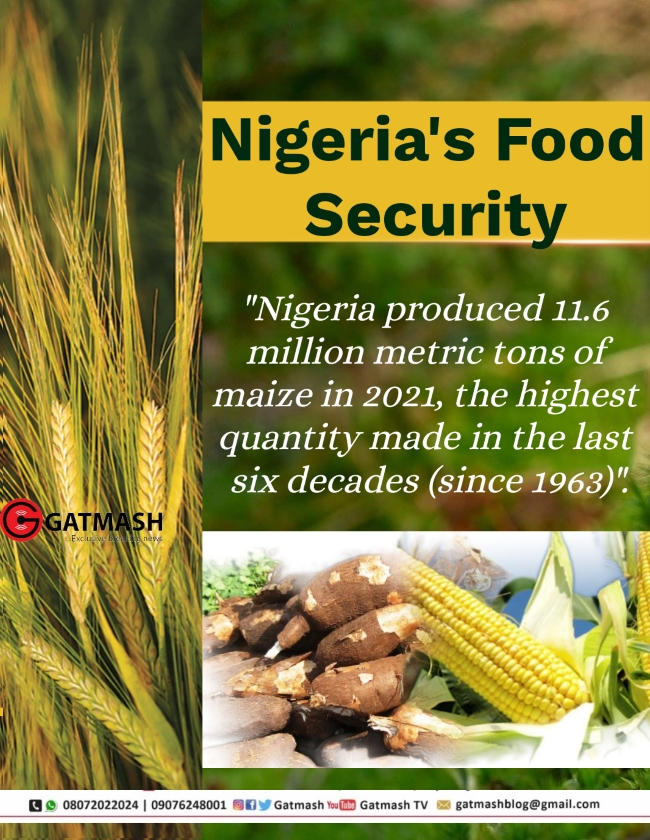By Theresa Moses

Nigeria’s remarkable agricultural transformation in recent times has caught the world’s attention. The stories of local farmers, innovative practices, and government initiatives have turned Nigeria into a beacon of hope for food security.
From the bustling markets of Kano to the fertile fields of Benue, the food basket of the nation, one can see the resilience and determination of Nigerian farmers, especially those who have embraced modern techniques and sustainable farming methods. Through interviews with farmers, experts, and policymakers, the media highlights success stories and challenges faced by the country’s agriculture sector.
Technology has played a vital role in revolutionising agriculture – from mobile apps connecting farmers to vital information to drones used for precision agriculture. These are examples of government’s efforts to provide support, promote agribusiness and reduce food import dependency,

The essence of Nigeria’s agricultural journey and its crucial role in ensuring food security not only for its citizens but for the world cannot be overemphasised. Our success story is not just a story about modernised agricultural practices and technology, including precision farming and the use of mobile apps for farming information, which have significantly increased agricultural productivity; it’s a celebration of human spirit, innovation, and dedication to feeding a hungry nation.
Nigeria’s journey towards agricultural excellence and becoming a beacon of hope for food security is a source of inspiration4 for countries worldwide striving to achieve food security. This is evident through a combination of government initiatives, agricultural reforms, and increasing agricultural productivity. For instance, Nigeria is the largest producer of cassava in the world, accounting for about 20 per cent of the total global production. With an annual output of over 54 million metric tons, cassava serves as a staple food and raw material for various industries.
Africa’s biggest economy churned out 63 million metric tons of cassava tubers in 2021, according to data from the Food and Agricultural Organization (FAO), which accounts for one-fifth of global production. Considering the global valuation and profiles of cassava derivatives, if optimised for maximum productivity, Nigeria’s cassava value chain should be able to raise the GDP level by at least N10 trillion, generate millions of jobs for the economy, and improve the country’s food security position, according to the Nigeria Cassava Growers Association (NCGA).
In 2021, the Central Bank of Nigeria said the country’s cassava by-products import value stood in the region of $580 million.
Maize production in Nigeria has increased significantly, from over 10 million metric tons in 2020 to 12.75 million metric tons in 2021. According to data published by the United States Department of Agriculture (USDA), Nigeria produced 11.6 million metric tons of maize in 2021, the highest quantity made in the last six decades (since 1963). The figure, when compared to the 10 million metric tons recorded in 2020, shows a 16 per cent increase.

According to Edwin Chigozie Uche, President of the Maize Growers and Processors Association of Nigeria, Nigeria produced 23 million metric tons (mmt) of maize in 2022. This will represent a 12 per cent increase from what was produced in 2021.
The country’s rice production has seen remarkable growth, reducing the need for rice imports. In 2020, Nigeria produced approximately 5.8 million metric tons of rice. According to Statista, the volume of rice produced in Nigeria amounted to around 8.34 million metric tons in 2021.
What about the impact of government initiatives in recent times, such as the Anchor Borrowers Programme (ABP), initiated by the Central Bank of Nigeria, which supported millions of smallholder farmers by providing access to credit, improved seeds, and fertilisers? it has boosted agricultural productivity, increased food security, and improved the livelihoods of millions of farmers in recent years.

The Presidential Fertiliser Initiative (PFI) has led to a significant increase in fertiliser availability and affordability, benefiting farmers.
Youth engagement in agriculture is on the rise, with more young Nigerians embracing agriculture as a viable livelihood. The National Youth Investment Fund (NYIF) and other youth-focused programmes have encouraged this trend, though more is expected.
Kudos to the private sector that has shown increasing interest in agriculture and those that have invested heavily, like Nestle Nigeria. More companies and investors are putting resources into agribusiness, boosting modern farming practices, and facilitating value addition along the agricultural value chain.
Nigeria’s dependence on food imports has drastically decreased due to increased local production. This has not only saved foreign exchange but also enhanced food security. Government policies and reforms, such as the Agricultural Promotion Policy (APP) and the Nigeria Agriculture Insurance Scheme (NAIS), have improved the overall food security situation.
Nigeria’s Food Security Index has shown improvements in recent years, indicating increased access to food and reduced levels of hunger and malnutrition, thus demonstrating Nigeria’s progress in its journey towards achieving food security. While challenges persist, the country’s commitment to improving agricultural productivity and supporting its farmers positions it as a beacon of hope in addressing food security concerns.
Share your story or I Witness Reports with us 24/7 via: SMS/ Whatsapp: +234(0)8072022024, Email: [email protected], follow us on our social media platform: Twitter, Instagram, Facebook:@Gatmash and Subscribe to our YouTube Channel: Gatmash TV.
Gatmash News is one of the most sought- afterb news portals, with increasing audience, exclusive breaking newsg and reports across the globe. Plus more. Website: https://gatmash.com
For advert placement, contact us today via email: [email protected] or call our hotlines on Tel: +234(0)8072022024





